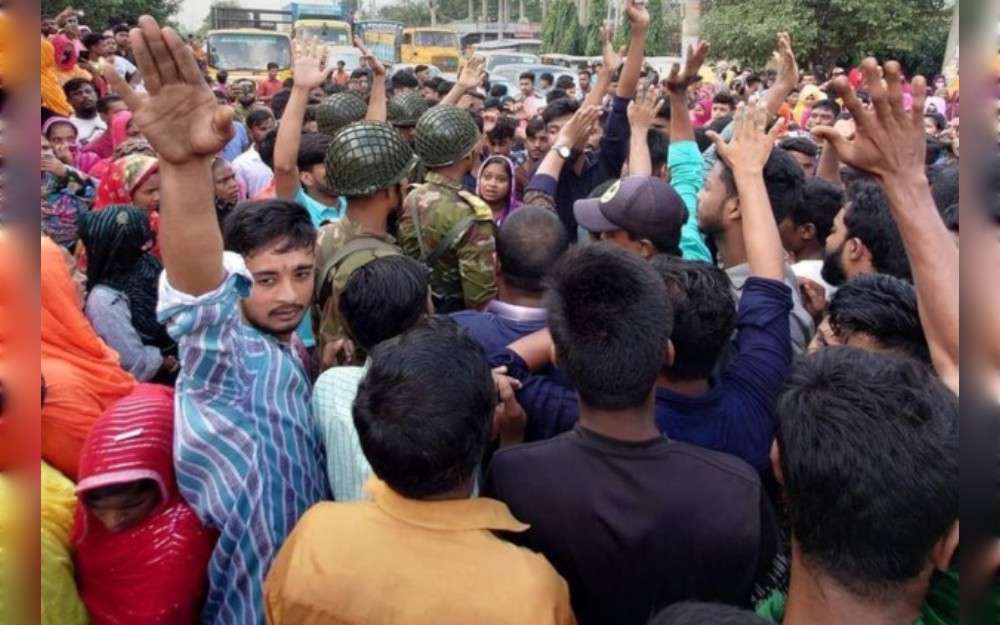About 130 factories closed across the nation on Tuesday as pickets sought back wages, better pay.
Ahammad Foyez/Dhaka

Bangladeshi workers launched protests for a third consecutive day outside about 130 garment factories on Tuesday to demand higher wages, marking the first such action in the country’s all-important ready-made garment sector since an interim government took office last month.
Factory owners suspended production at about 150 plants on Monday in several key industrial areas in Gazipur and Narayanganj districts amid unrest, which led to the deployment of a joint operation involving military and police personnel.
“As the situation became normal on Tuesday and all the factories returned to normal functions amid heavy security of law enforcers, the deployment was decreasing in the afternoon. Suddenly, a group of people again came into the street and started vandalizing,” Shafiul Islam Mohiuddin, president of the Bangladesh Garment Manufacturers and Exporters Association (BGMEA), told BenarNews.
He said “outsiders” had gathered in front of factories to demand jobs and pressure factory workers to leave work and join with them. This led to nearly 130 factories suspending production on Tuesday.
“Some people are trying to get illegal benefits, creating such unrest. We already talked with the concerned authorities and they assured us that necessary steps would be taken in this regard,” he said.
The protests by garment workers represent the latest unrest to challenge a transitional government headed by Muhammad Yunus, the Nobel Peace Prize laureate and micro-lending pioneer.
The interim government has been struggling to stabilize the country and maintain law and order since it took over from the 15-year-old administration of Sheikh Hasina, who resigned and fled the country on Aug. 5 during student-led, anti-government protests.
Sarwar Hossain, president of Bangladesh Garments Workers Union Federation, also expressed concern about outsiders affecting the workforce.
“We the workers want to maintain the industrial production. We want to realize some demands of our workers in a systematic way, but now those who attacked the garment factories are not workers,” he told BenarNews.
The ready-made garment (RMG) industry is a pillar of the South Asian nation’s economy. In November 2023, more than 80% of Bangladesh’s U.S. $47 billion exports came from the garment industry, where thousands of factories manufacture clothes for major Western brands such as H&M and Gap Inc., according to government figures.
On Tuesday, a garment worker said she and others were protesting for improved pay, but outsiders joined and disrupted their efforts.
“We have been agitating for back wages and an increase in pay. Now we cannot say who came and protested in our factory areas,” Khokon Mia, who works at the Jamuna Denim factory in the Konabari area of Gazipur, told BenarNews.
‘Jhute business’
Hossain, of the workers’ federation, suspected that in the wake of the political changeover following Hasina’s sudden departure, some groups were seeking to take control of markets, specifically the “jhute business.”
Locally, garments rejected as export quality are called “jhute.” Politically influential groups seek to control those products as they are in high demand domestically.
Asif Mahmud Shojib Bhuiyan, an adviser to the labor and employment ministry, also blamed outsiders for trying to incite strikers.
“Some protests by workers are justified due to unpaid wages and allowances,” he told reporters after a meeting with labor leaders at his ministry office in Dhaka.
He said the government was committed to addressing workers’ legitimate demands, but would not tolerate efforts by outsiders to create chaos within the industry.
“That unrest was being exacerbated by disputes over the control of the jute business, with political party leaders allegedly involved in these activities,” he said.
Imran Hossain, Gazipur Industrial Police additional superintendent, told reporters that at one point protesters blocked the Dhaka-Mymensingh highway.
“When the police went to the spot after receiving the information, the angry workers threw bricks at the police. Five police officers were injured. Later, the army reached the spot and removed the workers from the road,” he said.
Earlier in the day, a group of business officials met with Yunus and asked him to ensure factory security.
After the meeting, Mahbubur Rahman, president of the International Chamber of Commerce Bangladesh, told reporters that Yunus had assured attendees that the government would take necessary action.
Copyright ©2015-2024, BenarNews. Used with the permission of BenarNews.














